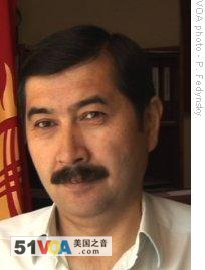Moscow
28 February 2009
In recent years, Central Asian republics of the former Soviet Union have emerged as increasingly independent players in a region where Moscow was the only player for most of the 20th century. Central Asia's strategic location in the middle of the world's biggest continent and its generous supplies of energy and water offer local leaders an opportunity to balance international interests with their own.
Uzbekistan on Wednesday agreed to allow NATO to use its territory to transport non-military cargo to Afghanistan; partially reversing the 2005 eviction of the United States from an Uzbek air base after Washington criticized the country's human rights record. Turkmenistan has also indicated it would allow transfer of NATO humanitarian cargo. But earlier in February, Kyrgyzstan evicted the United States from its Manas air base near Bishkek after Russia offered that country a multi-billion dollar aid package.
Political observers say these decisions reflect a new direction of foreign policy for Central Asian countries. They say it allows them to makes decisions based on the best deals, be it with Russia, the United States, China, or the European Union.
 |
| Murat Suimbayev |
Suimbayev says Central Asian countries cannot, for example, sell cotton to the United States, but they can to Russia, so accordingly, there is little prospect of the U.S. becoming a significant trading partner in Central Asia. This, he says, was a factor that made it so easy for Uzbekistan to reject a strategic partnership with America in 2005 and why Kyrgyzstan evicted the U.S. from its Manas airbase. Suimbayev adds that the decisions were relatively painless in terms of trade or security.
Though Kyrgyzstan's decision may have been influenced by Russia, Moscow's relations with Tajikistan have cooled over the past two years. Andrei Grozin, head of the Central Asia Department at Moscow's CIS Institute, says this is because of mounting problems in Tajikistan.
Grozin says Tajikistan is looking for a power center that could help solve those problems. He says he doesn't know if that center will be the United States, the European Union Russia or China, but suggests it does not matter to Tajik leaders. Grozin notes, however, that Russia does not want to assume responsibility for the problems of Tajikistan and other Central Asian countries during the current global economic downturn.
While Grozin recognizes Central Asia's potential for investment, including fossil fuels and hydroelectric power, he says they involve significant risk. He notes that the Obama administration is not likely to add Central Asian troubles to the burden it is already carrying in Afghanistan and Iraq.
Analysts say the U.S. interest in Central Asia beyond fighting the war in Afghanistan is not clear. But Washington is interested in pipelines that would deliver Central Asian oil and gas to the West, circumventing Russia. Currently, Moscow has a regional pipeline monopoly, but Alexey Malashenko, a Central Asian analyst at the Moscow Carnegie Center, says it is likely to be broken.
Malashenko says the question is how Russia will lose its monopoly, and what it will do to preserve its influence and positions along alternate routes. He says maintaining that influence is very important, and if Russia has smart people, they will take care of the matter; if not, there's nothing Russians can do about it.
Where Kazakhstan and Turkmenistan have large supplies of oil and natural gas, Kyrgyzstan and Tajikistan have an abundance of a more vital commodity -- water. Uzbekistan and Kazakhstan have shortages.
Grozin says the issue of water is an irritant in Uzbek-Tajik relations. Tajikistan is considering construction of a dam, which Tashkent fears would give Dushanbe too much political leverage.
Malashenko agrees about the importance of water in Central Asia. He says water is [the region's] most painful and dangerous issue, because if a local conflict erupts, it won't be over borders or ethnic problems, but for water, because water is life. He says no one has been able to serve as an intermediary, or to offer a solution to the problem [of water shortages], though everyone has tried -- Russia, the Chinese and now Europe.
Maleshenko says, although Central Asian countries are members of several regional economic and security organizations, there is more conflict than cooperation among them. He notes numerous border disputes and poor economic ties as reflected by the absence of direct flights between Tashkent and Dushanbe. Grozin adds that Kazakhstan, the regional economic leader, has begun deporting its neighbors' impoverished migrant workers, and is involved in a contest for regional political leadership with Uzbekistan. Grozin says the global economic crisis has also limited the potential to develop Central Asia.
Grozin says all of the problems we see today in the economies of post-Soviet Central Asia are tied to sharply diminished interest in the region by international players. He says it is an area that remains interesting, but not a priority.
Malashenko says the countries of Central Asia are forging their own national identities, though memory of the Soviet Union and a time of no borders still lingers, particularly among the older generation. But he hastens to add that few would favor a return of Soviet rule, especially the young.